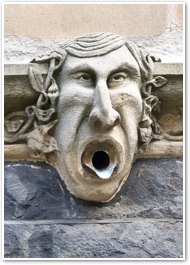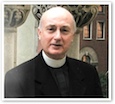Only in Wonderland
- FATHER GEORGE RUTLER
In an age of moral confusion, there are those who would suggest that the word "not" has been interpolated in several of the Commandments.
 It is easy to make words mean what one wants them to mean: in fiction, Humpty Dumpty did that in Wonderland and in fact, the Anti-Christ did that in the Wilderness. Satan is clever at quoting words out of context to make them mean what they do not mean. After forty days, Christ mocked that deceit. "You shall not tempt the Lord your God" (Deuteronomy 6:16; Matthew 4:7).
It is easy to make words mean what one wants them to mean: in fiction, Humpty Dumpty did that in Wonderland and in fact, the Anti-Christ did that in the Wilderness. Satan is clever at quoting words out of context to make them mean what they do not mean. After forty days, Christ mocked that deceit. "You shall not tempt the Lord your God" (Deuteronomy 6:16; Matthew 4:7).
Jesus is the Living Word because he explains the true meaning of words. He abhors hypocrisy because it twists words, and will actually crucify the Word himself: "But now you seek to kill me, a man who has told you the truth" (John 8:40).
Recently, a befuddled theologian tried to justify his misrepresentation of doctrine by saying: "Theology is not Mathematics. 2 + 2 in Theology can make 5. Because it has to do with God and the real life of people." Only in Wonderland does reality contradict the real life of people, and only in the Wilderness does the Tempter try to make God contradict himself. The Church is clear on that: "Though faith is above reason, there can never be any real discrepancy between faith and reason. Since the same God who reveals mysteries and infuses faith has bestowed the light of reason on the human mind, God cannot deny himself, nor can truth ever contradict truth" (Catechism of the Catholic Church, 159).
Denial of reality is the vice of superstition, which comes in various forms, abusing the virtue of religion. A religious enthusiast who says God can twist reality is as superstitious as the atheist who says there is no God at all, or the positivist who says that man is God, or the pantheist whose god is the world.
Professor Einstein wrote, "Science without religion is lame, religion without science is blind." Those words have been twisted vainly by some to suggest that the theoretical physicist was a religious man. Later in life he spoke of a "cosmic religious feeling," and that made it difficult to pigeonhole him as either an atheist or a secret believer. Challenging what seemed to be random disorder in quantum theory, he remarked in 1926 that God "does not play dice." Other than that, he revered the objectivity of truth, and would not allow the relativity of matter to justify philosophical relativism. 2 + 2 can never equal 5. That would be a mistake in physical science, and it would be a superstition in religion.
One Christmas in Princeton, carolers sang "Silent Night" outside Einstein's house on Mercer Street. He did not sing their words, but he accompanied them on his violin. That was more honest than any aberrant theologian who crucifies the Living Word by wrongly conjugating him.
 This is Meaghen Gonzalez, Editor of CERC. I hope you appreciated this piece. We curate these articles especially for believers like you.
This is Meaghen Gonzalez, Editor of CERC. I hope you appreciated this piece. We curate these articles especially for believers like you.
Please show your appreciation by making a $3 donation. CERC is entirely reader supported.

Acknowledgement
 Father George W. Rutler. "Only in Wonderland." From the Pastor (March 19, 2017).
Father George W. Rutler. "Only in Wonderland." From the Pastor (March 19, 2017).
Reprinted with permission from Father George W. Rutler.
The Author
 Father George W. Rutler is the pastor of St. Michael's church in New York City. He has written many books, including: The Wit and Wisdom of Father George Rutler, The Stories of Hymns, Hints of Heaven: The Parables of Christ and What They Mean for You, Principalities and Powers: Spiritual Combat 1942-1943, Cloud of Witnesses — Dead People I Knew When They Were Alive, Coincidentally: Unserious Reflections on Trivial Connections, A Crisis of Saints: Essays on People and Principles, Brightest and Best, and Adam Danced: The Cross and the Seven Deadly Sins.
Father George W. Rutler is the pastor of St. Michael's church in New York City. He has written many books, including: The Wit and Wisdom of Father George Rutler, The Stories of Hymns, Hints of Heaven: The Parables of Christ and What They Mean for You, Principalities and Powers: Spiritual Combat 1942-1943, Cloud of Witnesses — Dead People I Knew When They Were Alive, Coincidentally: Unserious Reflections on Trivial Connections, A Crisis of Saints: Essays on People and Principles, Brightest and Best, and Adam Danced: The Cross and the Seven Deadly Sins.




